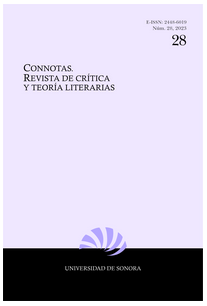Stolen childhoods. Motherhood and child trafficking in the Salvadoran and Guatemalan postwar narrative
DOI:
https://doi.org/10.36798/critlit.v0i27.456Keywords:
Central American narrative, armed conflict, childhood, motherhoodAbstract
This paper explores the dynamics of illicit children adoption in the Central American postwar contexts in the novels The Long Night of the White Chickens and Roza tumba quema by the writers Francisco Goldman and Claudia Hernández. This article observes how literature addresses the war experience from the perspective of the combatant mothers, the role that the armed conflict played in the creation of a child population orphaned or separated from their biological family and the participation of both armed organizations and the church in the illegal adoptions
of these children. The illegal adoptions, child traffi cking, corruption and neglect of foster homes represented in Hernández’ and Goldman’s novels demand a more incisive look at the experience of from other perspectives such as children’s or women’s. We consider that with the representation of these experiences arise the interpellations that from literature also seek to recognize the direct violence committed against children during the war and the symbolic violence that prevails today.
Downloads
References
Amantze Regueiro, Sabina. “El secuestro como abandono. Adopciones e institucionalizaciones de niños durante la última dictadura militar argentina”. Revista Katálysis, 16. jul. 2013, pp. 175-185, https://doi.org/10.1590/S1414-49802013000200003. DOI: https://doi.org/10.1590/S1414-49802013000200003
Craft, Linda. “La adopción internacional como modelo ficticio en The Long Night of the White Chickens de Francisco Goldman”. Mesoamérica, vol. 18, no. 34. 1997, pp. 667-680.
Escalón, Sebastián. “Los niños que el ejército se llevó”. Plaza pública, 6 ago. 2013, https://www.plazapublica.com.gt/content/los-ninos-que-el-ejercito-se-llevo-i.
Goldman, Francisco. The Long Night of the White Chickens. Grove Atlantic, 2007.
Hernández, Claudia. Roza tumba quema. Sexto Piso, 2018.
Jossa, Emanuela. “Cuerpos y espacios en los cuentos de Claudia Hernández. Decepción y resistencia”. Centroamericana, vol. 24, no. 1. 2014, pp. 5-37.
Montes, Rocío. “Violadas, embarazadas y torturadas: las mujeres como botín de guerra en la dictadura de Pinochet”. El País, 11 sep. 2019, https://elpais.com/internacional/2019/09/10/america/1568135550_217522.html.
Ortiz Wallner, Alejandra. “Guerra y escritura en Roza tumba quema (2017) de Claudia Hernández”. Letral, no. 22, jul. 2019, pp. 110-128, https://revistaseug.ugr.es/index.php/letral/article/view/9306/8344. DOI: https://doi.org/10.30827/rl.v0i22.9306
Osorio, Elsa. A veinte años, Luz. Siruela, 2012.
Torres, Elizabeth, et al. “La infancia y los niños en tiempos de guerra: el caso de Nicaragua, El Salvador y Guatemala”. Palobra: Palabra que obra, 18 ago. 2018, pp. 194-215, https://doi.org/10.32997/2346-2884-vol.0-num.18-2018-2171. DOI: https://doi.org/10.32997/2346-2884-vol.0-num.18-2018-2171
Downloads
Published
How to Cite
Issue
Section
License
The authors always maintain the moral and patrimonial rights of their work. They only grant the non-exclusive license of use to Connotas for their first publication. Therefore, the authors may make other independent and additional contractual agreements for the publication of their article, review or other text originally published in Connotas or with modifications (including the title) as long as they clearly indicate that the paper was first published in Connotas. Revista de crítica y teoría literarias. Connotas undertakes not to make commercial use of the texts it receives or publishes.
See also "Copyright and Licences".









